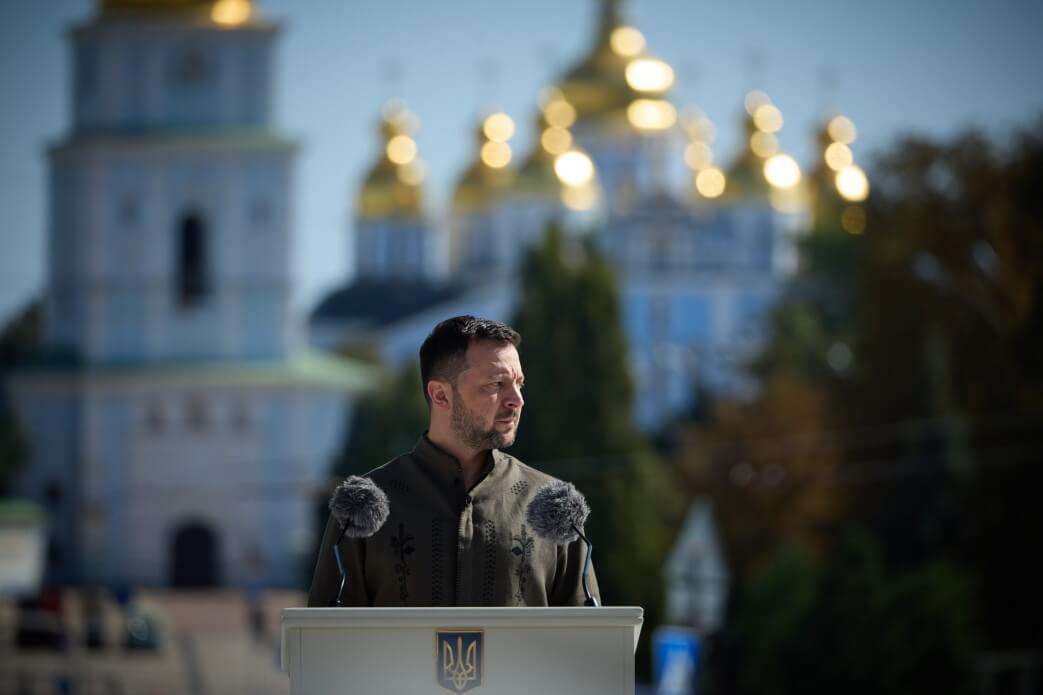During the late 1980s, when Russia was on the verge of becoming a free and democratic country, famous Russian rock performer Igor Talkov included the line, "Show me a country where the priest hides his KGB epaulette under his cassock" in one of his songs. He was killed in 1991.
This week's decision by the Ukrainian parliament to ban the Ukrainian Orthodox Church evoked memories of the great star's verses from turbulent times and the subsequent collapse of the USSR.
This church claimed to have severed ties with the Russian Orthodox Church after Russia invaded Ukraine, but the Ukrainians never believed it.
The decision to ban its activities was logical and long overdue, as a way for Kyiv to spare the Ukrainian people from the camouflaged pro-Kremlin indoctrination that the Russian Orthodox Church has always conducted in Ukraine.
Clear and present danger
The Russian Orthodox Church and its outpost in Ukraine were a clear and present danger to the Ukrainian desire to become a completely independent and free country. The Russian Orthodox Church had a secondary purpose in Ukraine, after all, as in all countries around the world where it has its own churches and priests.
Since 1943, when Stalin allowed the Russian Orthodox Church to operate, it has had close ties not only with the Kremlin but also with Russian intelligence.
Stalin revived the Russian Orthodox Church to control and monitor religious masses, as well as to enlist spies who would be posing as priests.
Russian intelligence fully integrated the Russian Orthodox Church, positioning it at the top of the Russian imperial structure
With Vladimir Putin, everything has intensified. Russian intelligence fully integrated the Russian Orthodox Church, positioning it at the top of the Russian imperial structure, a role it has always played throughout history.
That is why depriving the Kremlin of influence in Ukraine by shutting down the Russian Orthodox Church was imperative for Ukrainian independence and extremely painful for Russia’s imperial agenda in Ukraine.
Foreign policy instrument
The Russian Orthodox Church is a powerful foreign policy instrument that the Kremlin knows how to use.
The Kremlin can pretend to have deep religious feelings, but the presence of the Russian Orthodox Church among Russia's close allies enables the Kremlin to cultivate conservatives worldwide.
After banning its activities, the Kremlin will fight to keep its church in Ukraine.
 Kyiv's decision is noteworthy and far-reaching because it closed one of the main avenues of imperial influence that Moscow uses to obstruct the complete independence of every country it considers to be under its control
Kyiv's decision is noteworthy and far-reaching because it closed one of the main avenues of imperial influence that Moscow uses to obstruct the complete independence of every country it considers to be under its control
Moscow will continue, much stronger than before, to accuse Kyiv of being satanist and anti-Christian. The Kremlin will use its foreign allies to discredit Ukraine, the Ukrainian authorities, and President Volodymyr Zelensky.
Until now, Moscow politicians and their mouthpieces have been saying such things at the expense of Ukraine's leadership, implying that Orthodox religious rights are under threat.
In terms of Orthodox Christianity and the faith itself, the removal of the Russian Orthodox Church from Ukraine is significant but nevertheless bearable because Ukraine has another Orthodox Christian Church.
The second one, the Orthodox Church of Ukraine, is available for worship by all people in Ukraine, and the vast majority of Ukrainians belong to it.
The Orthodox Church of Ukraine made a decision to cut ties with Moscow in January 2019 and has been under the jurisdiction of the Patriarchate of Constantinople since then. This was a painful blow to Russian imperial ambitions in Ukraine.
Russia will certainly meddle with the religious feelings of Christian congregations, both in Ukraine and around the world. It will use all of the resources and influence that the Russian Orthodox Church has to instigate domestic unrest in Ukraine.
Unfortunately for Ukraine, the Russian Orthodox Church continues to exert significant influence in Ukraine, even after the Russian invasion, due to its historical control over the entire USSR (and the Russian empire before that), including Ukraine.
In this respect, the Kyiv parliament's decision is noteworthy and far-reaching because it closed one of the main avenues of imperial influence that Moscow uses to obstruct the complete independence of every country it considers to be under its control.